Suggested Questions for President Ahmadinejad
Next: Interviewers and Human Rights Issues Discussed
Back to Page 1 of Suggested Questions
8. Question on allegations of forced confessions
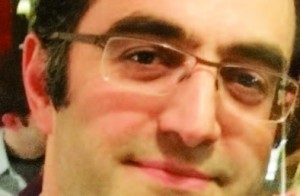 Question: How do you respond to allegations by former prisoners that the Iranian Intelligence Ministry forced them to make false confessions which were broadcast on Iran’s national TV? What have you done to stop this?
Question: How do you respond to allegations by former prisoners that the Iranian Intelligence Ministry forced them to make false confessions which were broadcast on Iran’s national TV? What have you done to stop this?
———————————
Background:
Maziar Bahari, an Iranian-Canadian journalist, spent three months in prison after the Iranian election in 2009. Bahari, who made confessions under duress, told the International Campaign for Human Rights in Iran that his taped confession was a fabricated show, coordinated by Iranian state television and certain press outlets close to the Iranian government.
“Three teams of reporters came into the prison, Press TV, IRIB’s Persian service, and Fars News Agency…the interrogator said, ‘We will give some of the footage from your confession to be broadcast on the 8:30 program.’ During the confessions, the IRIB team members talked to the interrogators…they were completely coordinated. For example, the interrogator would hand them a piece of paper and would say: make sure
you ask this question, too,’” said Bahari.
Bahari told the Campaign that when he told his interrogator that he would not be able to remember all the questions and answers he was supposed to repeat before the camera, his interrogator said, “’In order to make it easier [for you], we will convert the text of your confessions into questions and answers. Therefore, the reporters would ask these questions and you would answer them.’ Therefore each of the three reporters had a set of questions and I gave the answers I was supposed to give. One was a reporter from the IRIB Persian service, one was a reporter from the English language Press TV, and the other was a reporter from Fars News Agency. All three of them and I were reading from a script. The IRIB reporters read the interrogator’s questions. When I made a mistake, just like an interrogator, the reporter would say ‘It’s better if you say it
this way.’”
9. Question on trials behind closed doors
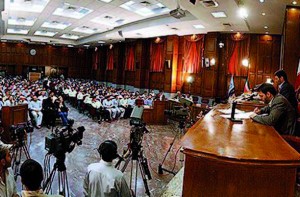 Question: Do you agree with holding trials behind closed doors? If your Intelligence Ministry is confident that its claims against political prisoners are valid, why do they force them to appear on camera while they are in detention and talk against themselves? As you know, almost all of those who have confessed to their alleged wrongdoings while in prison, have later said those confessions were made under pressure. Why don’t you stop your Intelligence Ministry from committing such gross violations of human rights?
Question: Do you agree with holding trials behind closed doors? If your Intelligence Ministry is confident that its claims against political prisoners are valid, why do they force them to appear on camera while they are in detention and talk against themselves? As you know, almost all of those who have confessed to their alleged wrongdoings while in prison, have later said those confessions were made under pressure. Why don’t you stop your Intelligence Ministry from committing such gross violations of human rights?
– And if you don’t agree what have you done to stop this?
———————————
Background:
The Iranian state-controlled radio and television, Islamic Republic of Iran Broadcasting (IRIB), has acted as an arm of intelligence and security agencies implicated in gross human rights violations since the disputed presidential election of June 2009.
The International Campaign for Human Rights in Iran’s research and investigations into the content of programs produced and broadcast by the IRIB reveal a close working relationship between intelligence and judiciary officials in charge of prosecuting post-election detainees, such as in the case of Maziar Bahari, a Newsweek journalist who was detained last year. (See background information on Question 8.)
The Campaign’s research indicates that IRIB producers worked hand in hand with interrogators, intelligence officials, and judiciary officials to obtain and film false confessions. Through heavily edited segments, scenarios were propagated, promoted by the Intelligence Ministry, to conceal human rights violations and make unfounded allegations against dissidents.
A former IRGC commander and the chief editor of a reformist website, Hamzeh Karami has recently published an open letter to the Iranian Prosecutor General, in which he talks about torture during his interrogation sessions in the more than a year he spent at Evin Prison after the June 2009 elections.
Karami was detained following the June 2009 Iranian presidential election and was tortured into making a false confession of illicit sexual relations with relatives of opposition Green movement leaders. “They put my head in a dirty toilet 20 times to make me give a false confession. When I screamed ‘Ya Allah’ they said, ‘We are your God today and will do to you whatever we want.’” In the forced confession he gave at the Tehran mass trial last August, Karami implicated Mehdi Hashemi, the son of Hashemi Rafsanjani, claiming that Hashemi had been involved in fraud and manipulation of the Presidential election.
10. Question on stoning
Question: Do you agree with stoning? What is your personal opinion about stoning?
– And if you don’t agree what have you done to stop this?
———————————
Background:
The Islamic Penal Code (IPC) requires the punishment of stoning for married persons accused of adultery. The following are some observations on the law:
- According to Iranian law, adultery shall be punishable by stoning if it is committed by a married man or woman who has access to their wife or husband for sexual intercourse. If adultery is proven by his/her confession, then at the time of stoning the first stone will be thrown by the Sharia judge and then by others. If the adultery is proven by the testimony of witnesses (only male witnesses’ testimony is admissible), then the first stone will be thrown by the witnesses, followed by the Sharia judge, and then others (Articles 83 and 99 of IPC).
- During this punishment, it is deemed appropriate for the Sharia Judge to inform people about the stoning time and date. It is necessary for a group of believers, no fewer than three, to be present during the stoning (Article 101 of IPC). The stoning of an adulterer or adulteress shall be carried out while each is placed in a hole and covered with soil, he up to his waist and she up to a line above her breasts (Article 102 of IPC). The size of the stone used in stoning shall not be too large to kill the convict by one or two throws and at the same time shall not be too small not to be considered a stone (Article 104 of IPC). From 2006-2008 we know of six cases of stoning being implemented. Currently we have a list of ten prisoners sentenced to stoning and being held in Iranian prisons: three men and seven women.
The six cases of stoning carried out between 2006-2008 all took place in secret. The authorities not only hide the implementation of sentences from the general public, they also avoid any public admission that such sentences are issued and implemented. For example, during the television program aired recently on Iranian TV, in which Sakineh Mohammadi was brought on to make “confessions,” the entire program did not mention the word “stoning” even once and did not admit the international outcry is over the practice of stoning.
11. Question on freedom of speech in Iran
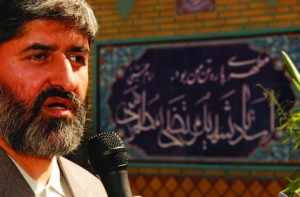 Question: This is what Ali Motahari, the conservative Member of Parliament, says about the situation of freedom of
Question: This is what Ali Motahari, the conservative Member of Parliament, says about the situation of freedom of
speech in Iran:’
“Right now, if you criticize high-ranking officials of the government, it won’t get published. Whichever newspaper wants to publish this criticism will be banned or if a website wishes to publish this kind of talk, it will get into trouble. For the past several months, none of the interviews I have done have been published in full.”
“Wherever there is the probability that the President or his cabinet might feel insulted, the content is taken out. We ask ‘Why did you take it out?’ They say, ‘If we print it, they’ll ban our newspaper.’ Is this how you wish us to prevent over evil? Unfortunately, the atmosphere is closed. There is an atmosphere of suffocation. Up until a year ago, things could be said more freely, but now the circumstances have changed.”
Why can’t you tolerate your critics?
———————————
Background:
Dozens of newspapers and websites have been banned since Mahmoud Ahmadinejad came into office. Hundreds of Iranian journalists and bloggers have been arrested during the same time, most of them after Ahmadinejad’s second election victory. Hundreds of university students who protested the election results were arrested, many of them imprisoned with long prison terms, exiles, and deprivation from education. Dozens of university professors and lecturers have been forced into early retirement or dismissed because of their independence of thought. Ahmadinejad’s Ministry of Intelligence, Ministry of Culture and Islamic Guidance, Ministry of Science, Research, and Technology, and Ministry of Education have been instrumental in silencing those critical of the government and persecuting, interrogating, torturing, dismissing, and banning intellectuals, artists, journalists, activists, university students, faculty members, and union activists.
12. Question on violations of the right to education
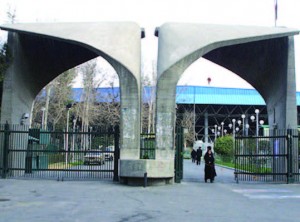 Question: Over the past 4 years dozens of students have been denied pursuing higher education because of their political activities at universities. Some of them who have tried to object to the decision made by your Ministry of Science and Technology have been sent to prison. Is this not a form of educational apartheid, and are you prepared to end this practice?
Question: Over the past 4 years dozens of students have been denied pursuing higher education because of their political activities at universities. Some of them who have tried to object to the decision made by your Ministry of Science and Technology have been sent to prison. Is this not a form of educational apartheid, and are you prepared to end this practice?
———————————
Background:
The right to education is an internationally recognized right and is explicitly enshrined in Iran’s constitution. However, since 1980, when the Supreme Council for the Cultural Revolution was formed, it has been extensively violated.
Since Mahmoud Ahmadinejad took office in 2005, these violations have considerably increased with a coordinated assault by the Ministry of Science, Intelligence Ministry, and the Judiciary, aimed at depriving student activists from continuing their higher education.
Since fall 2006, disciplinary committees on university campuses have routinely summoned dissident students and sentenced them to suspension terms. The increasing use of such committees to deprive students of their right to education—in violation of Iran’s international legal obligations– is aimed at intimidating the student body throughout the country. Suspension sentences ranging from one to three
semesters have been issued.
In many cases, university officials did not even honor their own regulations and issued sentences in absentia without providing students a chance to defend themselves or become aware of the reason for their suspension.
During the last five years, the regime has systematically dismissed students they deem ‘dangerous’. According to reports by human rights activists, in the last year alone close to one thousand students were banned from education through this method.
13. Question on issues raised by the UN’s Human Rights Council
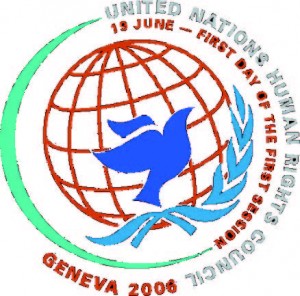 Question: Do you accept the universality of human rights as enshrined in the Universal Declaration of Human Rights to which Iran is a signatory? And if so, is this not inconsistent with Iran’s rejection of about 30 recommendations made by the UN’s Human Rights Council last June?
Question: Do you accept the universality of human rights as enshrined in the Universal Declaration of Human Rights to which Iran is a signatory? And if so, is this not inconsistent with Iran’s rejection of about 30 recommendations made by the UN’s Human Rights Council last June?
———————————
Background:
In June 2009, Mohammad Javad Larijani, Secretary-General of the High Council for Human Rights in Iran, and Head of the Iranian delegation to the United Nations Human Rights Council in Geneva, said that about 30 of the recommendations made to Iran during the June session of the UNHRC session in Geneva were rejected by the Iranian delegation because they were “against Iranian laws,” or “because they were disproportionate or contained poor language.” He then stated cases such as Iran’s refusal to join the United Nations Convention Against Torture, stating that Iran doesn’t join the Convention because there are types of punishment in Iran that are considered as torture in the Convention. He added that torture is prohibited in Iran and this is expressed in the Iranian Constitution.
Contrary to Larijani’s statements, there were cases which the Iranian delegation did not accept, deflecting blame by criticizing human rights violations in other countries thereby refusing to address the raised points. At one point, the Head of the Session reminded Larijani that the meeting was to review Iran’s report, not other countries. Those cases included prison torture, specifically, the events that took place at Kahrizak Detention Center, arbitrary and secret executions (such as the execution of Farzad Kamangar), long-term sentences after show trials (such as Jila Baniyaghoub’s 30 year ban from journalism), the refusal to grant congregation permits to political parties and opposition groups, and others. Larijani reiterated the government’s position that the murder of Neda Agha Soltan was committed by foreign agents, stating this claim without any comprehensive investigation into her murder or publication of the results of any such investigations. Many of the points raised in recommendations from other countries are important components of the Iranian Constitution and international commitments of the Iranian government, and are routinely violated by the Islamic Republic of Iran. The issues raised by member countries of the UN Human Rights Council did not have poor language, nor were they against the Iranian Constitution, but simply encapsulated the widespread and systematic violations of human rights in Iran, information Larijani tried to conceal during all his speeches, dodging accountability and instead criticizing the situation of human rights in other countries.
Larijani said that the main problem is that member countries “view some of our punishments as torture,” such as “flogging.” Disregarding the fact that Larijani claims that flogging is a legitimate form of punishment and not torture, there are numerous other “punishments” Iran should be held accountable for. “Punishments” such as solitary confinement, stoning, the amputation of arms and legs, isolation of prisoners from the outside world including refusing them access to their families, lawyers, and fresh air, and psychological pressure for the extraction of false confessions. Iran’s accession to the UN Convention Against Torture would make Iran accountable in these areas, despite attempts to redefine methods of torture as “punishment.”
Larijani considers the criticism of “Western countries” as their support for what he calls the “election sedition.” What he calls the “election sedition” are the instances of widespread violations of human rights in the past year, which aside from the related political issues, have never been addressed by Iranian authorities. The violators, whether they carried out or issued orders, have never been held accountable by the Iranian Judiciary for their actions. Politicizing the criticism against the widespread violations of human rights in no way reduces the responsibility of the Iranian judicial authorities for giving immunity to those who ordered and carried out post-election violence.
14. Question on criticism of Iran’s human rights record by foreign governments and international rights groups
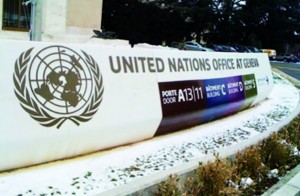 Question: You defend your country’s human rights record. But what do you think about the documented criticism of Iran’s human rights abuses by many foreign governments and international rights groups since 1984?
Question: You defend your country’s human rights record. But what do you think about the documented criticism of Iran’s human rights abuses by many foreign governments and international rights groups since 1984?
———————————
Background:
During the June 2010 United Nations Human Rights Council Session in Geneva, many governments and human rights organizations accused Iran of being duplicitous about its record, promising cooperation with the council over human rights issues while busily subverting many of them at home — including freedom of religion, expression and assembly and an independent judiciary.
Amnesty International said the Iranian government was taking aim at students, journalists, political activists, trade unionists, human rights defenders and members of ethnic and religious minorities.
“Executions have been carried out for politically motivated reasons and used to send a chilling message to those who would demonstrate,” the organization said in a statement. “These human rights violations appear to be committed by state officials with total impunity.”
The head of the Iranian delegation to the UN Human Rights Council, Mohammad Javad Larijani denied accusations that special United Nations rapporteurs investigating issues like torture had been denied access to Iran, saying they had an open invitation. He said Iran was held to a standard out of alignment with its Islamic culture.
“We are not a secular system, we are not a liberal system; we are perhaps the only democracy, the greatest democracy in the Middle East,” Larijani said in comments broadcast live via the Internet from Geneva.
(Also see background information on Question 13.)
15. Questions on prisoners who died during their detention

 Question: During the past few years several prisoners have died inside prisons, such as the blogger Omid Reza Mirsayafi in January 2008 and more recently four post-election protestors at Kahrizak prison. Have you done anything to address ill-treatment and torture inside prisons?
Question: During the past few years several prisoners have died inside prisons, such as the blogger Omid Reza Mirsayafi in January 2008 and more recently four post-election protestors at Kahrizak prison. Have you done anything to address ill-treatment and torture inside prisons?
———————————
Background:
Omid Reza Mirsayafi: On 18 March, 29-year-old blogger Omidreza Mirsayafi died while in Tehran’s Evin prison. According to an account by Hesam Firoozi, a physician also imprisoned in Evin, Mirsayafi had taken extra doses of his medication. Firoozi’s account, as provided by the group Human Rights Activists in Iran, notes that Mirsayafi suffered from serious depression. Firoozi was present during the initial stages of Mirsayafi’s treatment inside the prison’s medical clinic and reported that prison doctors failed to provide proper care by not sending him immediately to a hospital to save his life. Mirsayafi was prosecuted solely for his opinions expressed in his private blog. He was charged with insulting authorities and sentenced to two years and six months in prison.
Zahra Kazemi: Iranian-Canadian freelance photojournalist Zahra Kazemi died while a prisoner at Evin prison on 11 July 2003, almost three weeks after she was arrested for taking pictures outside the prison during a student protest in Tehran. Two days later, it was reported that Kazemi had died in hospital, after suffering a stroke during her interrogations. Two days later, in a contradictory statement, it was said that she had fallen, hitting her head on a hard object. On 16 July 16 2003, Mohammad Ali Abtahi, Iran’s then vice president, conceded that Kazemi had died as a result of being beaten.
Later, the Iranian government would charge an Iranian security agent in Kazemi’s death. He was acquitted of a charge of “involuntary murder.” In July 2004, Iran’s judiciary said the head injuries that killed Kazemi had come as a result of an “accident.”
The four detainees who died inside Kahrizak Detention Center: Hundreds of protesters were arrested during post-election events in Iran. More than 100 detainees were transferred to Kahrizak Detention Center. Witnesses and reports indicate widespread and consistent beating, torture, and violent mistreatment of detainees occurred at the sub-standard detention center. A 2009 investigation by the Iranian Parliament indicated that the order to send those detained on 9 July 2009 to the Kahrizak facility was issued by the then Tehran Prosecutor, Saeed Mortazavi. The violent treatment of the detainees by officers, the sub-standard hygiene of the facility, the physical abuse of prisoners by authorities, and criminal cellmates under orders from prison authorities caused the deaths of at least four young detainees Mohsen Rouholamini, Amir Javadifar, Mohammad Kamrani, and Ramin Aghazadeh. The young medical doctor who was in charge of the Kahrizak Detention Center’s Infirmary, was later found dead under mysterious circumstances.
16. Question on the discrimination against members of Iran’s Baha’i community
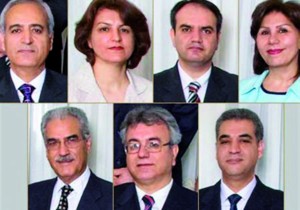 Question: Do people with Baha’i faith have the same rights as other Iranians? If so, why are Baha’is systematically refused the right to higher education?
Question: Do people with Baha’i faith have the same rights as other Iranians? If so, why are Baha’is systematically refused the right to higher education?
———————————
Background:
- Baha’is are banned from working in government offices.
- They are not allowed to study at university.
- Iranian inheritance laws do not apply to Baha’is
- Baha’i business owners are often denied a license to set up shop.
- Baha’i cemeteries have been desecrated (in Najafabad, Isfahan, Borujerd, Yazd, Semnan, Najafabad, Vilashahr, Abadan, Khorramshahr, Sangsar, Mashhad, and Damavand)Hateful graffiti on Baha’i houses and shops (in Abadeh)
- Arrests, detention, interrogation, and punishment of Baha’is in several cities for “propagating and spreading Baha’ism” and “propagation on behalf of an organization that is anti-Islamic.”
- Noticeable increase in the persecution of Baha’is since the election of President Mahmoud Ahmadinejad.
- Destruction of properties of Baha’i residents (in Ivel, Mazanderan)
Before his death last year, Iran’s Grand Ayatollah Hussein Ali Montazeri, the most senior authority on Shia Islam, issued a fatwa calling on the Iranian government to grant followers of the religion basic civil and political rights.
Mohammed Javad Larijani, head of the Human Rights Council of the Iranian Judiciary, defends court action against the religious group.
“Baha’is have to answer to the courts in Iran because they engaged in cult-type activities contrary to the most basic human rights of the people,” Larijani told the United Nations Human Rights Council.
Back to Main ———————————————————————————— Next




